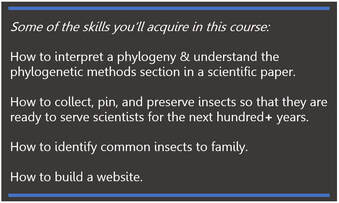The Murray Lab at WSU website is the updated site for the lab & current activities.
TAxonomic Entomology, Washington State University
|
ENTOM 539
taught fall 2020 |
Please check out our class final project: student species webpages
--> PNWinsects.weebly.com <--
The unifying theme of this website is “Insects of the Pacific Northwest”. Each graduate student chose an insect that could be found in the region -- often picking one that they work on for their MS or PhD research -- and designed a webpage around it.
--> PNWinsects.weebly.com <--
The unifying theme of this website is “Insects of the Pacific Northwest”. Each graduate student chose an insect that could be found in the region -- often picking one that they work on for their MS or PhD research -- and designed a webpage around it.
|
Course description:
This course is designed for graduate students in entomology. It is a required course for WSU grad students. Students from the University of Idaho (10 minutes away!) also take this course as part of a cooperative agreement between the two land grand universities. The course provides a broad overview of insect taxonomy, diversity, morphology, phylogeny, and evolution. Typically, this course has six hours of lab each week, but due to covid restrictions, we split into two groups and were able to still meet for three hours a week. So many insects & so little time! |
Insect Diversity and Evolution, Cornell
|
ENTOM 3310 & 3311
taught fall 2017 |
Course description:
This course is designed for undergraduate entomology or biology majors and graduate students from any department with an interest in insects. The course will provide a broad overview of insect diversity, morphology, phylogeny, evolution, and fossil history. We will discuss the origins of insects, evolutionary relationships among orders and families, the fossil record of insects, the methods commonly used to reconstruct phylogenies, and how the phylogenies of insects are changing with new data and new methods. We will also discuss how phenotypes and phylogenies contribute to taxonomic decisions.
This course is designed for undergraduate entomology or biology majors and graduate students from any department with an interest in insects. The course will provide a broad overview of insect diversity, morphology, phylogeny, evolution, and fossil history. We will discuss the origins of insects, evolutionary relationships among orders and families, the fossil record of insects, the methods commonly used to reconstruct phylogenies, and how the phylogenies of insects are changing with new data and new methods. We will also discuss how phenotypes and phylogenies contribute to taxonomic decisions.
Want to learn more about some of the Insects of Cornell? Each student picked an insect that could be found in the region and designed a webpage around it. In the process, the students chose a target audience, went through a peer review of each other’s site design and content, and learned a bit about website analytics.
insectsofcornell.weebly.com
insectsofcornell.weebly.com
Model-based phylogenetics and hypothesis testing, COrnell University
|
ENTOM 4610
offered spring 2015 & 2016 |
Course description:
A variety of disciplines in biological research address questions that rely on a phylogenetic framework for hypothesis testing, including the fields of ecology, epidemiology, behavior, physiology, evolution, and genomics. This course will provide an advanced undergraduate/graduate level introduction to model-based methods of phylogenetic analysis including maximum likelihood and Bayesian methods. The emphasis will be on DNA sequence data and issues associated with reconstructing phylogenetic trees from multiple gene loci. In addition, the course will cover how phylogenies can be used in the context of evolutionary hypothesis testing (including fossil-calibrated phylogenies, character mapping, ancestral state estimation, and historical biogeography) using rigorous statistical methods. The course will include a computer laboratory for performing analyses using real data sets. Beginning skills in R programming will be introduced, and students will build an independent dataset to analyze using the techniques introduced in class.
A variety of disciplines in biological research address questions that rely on a phylogenetic framework for hypothesis testing, including the fields of ecology, epidemiology, behavior, physiology, evolution, and genomics. This course will provide an advanced undergraduate/graduate level introduction to model-based methods of phylogenetic analysis including maximum likelihood and Bayesian methods. The emphasis will be on DNA sequence data and issues associated with reconstructing phylogenetic trees from multiple gene loci. In addition, the course will cover how phylogenies can be used in the context of evolutionary hypothesis testing (including fossil-calibrated phylogenies, character mapping, ancestral state estimation, and historical biogeography) using rigorous statistical methods. The course will include a computer laboratory for performing analyses using real data sets. Beginning skills in R programming will be introduced, and students will build an independent dataset to analyze using the techniques introduced in class.
some course instructional materials:
|
my 6 pg summary of a humorous how-to book
|
for beginner R users: how data elements are accessed
|
My teaching assistantships at the University of California, Riverside
Natural history of insects, entm 010 [2011]
professor: Rick Redak
A study of the fascinating world of insects and of their impact on man; designed for non-entomology majors. |
systematics, biol/entm 112 [2013]professors: Mark Springer & John Heraty
Principles and philosophy of classification: phylogenetic and phenetic methods, species concepts, taxonomic characters, evolution, hierarchy of categories, and nomenclature. |


